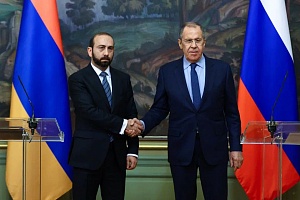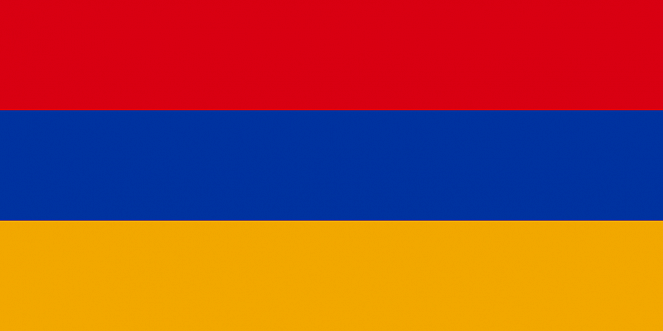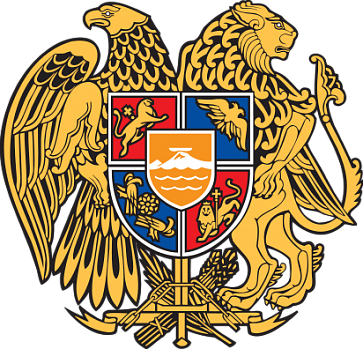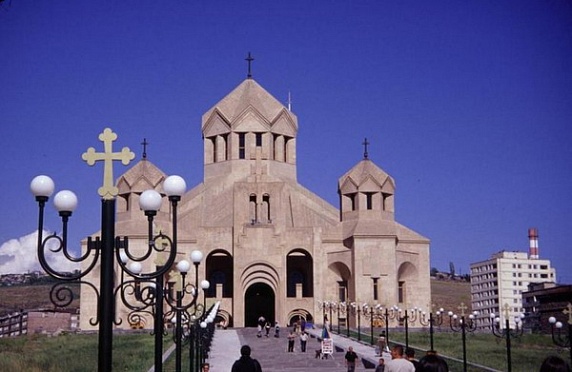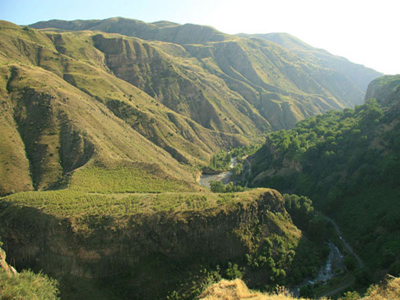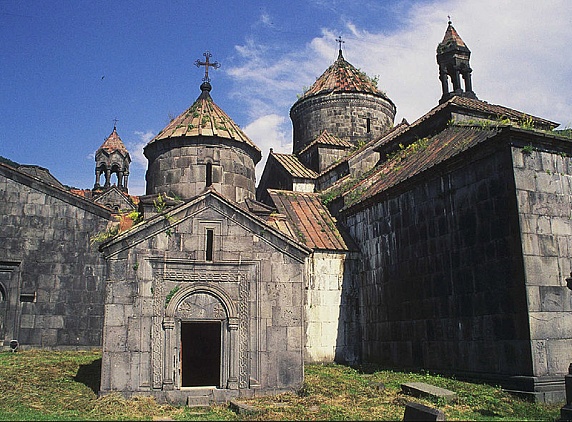 the Republic of Armenia
the Republic of Armenia
Foreign Minister Sergey Lavrov’s statement and answers to media questions during a joint news conference with Foreign Minister of the Republic of Armenia Ararat Mirzoyan following talks, Moscow, March 20, 2023
Mr Mirzoyan, ladies and gentlemen,
We held extended, fulfilling and useful talks. We discussed practically every aspect of bilateral relations, as well as regional and international issues. We outlined paths for continued development of our strategic partnership and alliance.
We note the very intensive political dialogue primarily at the top level. Beginning earlier this year, President Vladimir Putin and Prime Minister Nikol Pashinyan have had three long telephone conversations. On February 2, Prime Minister Mikhail Mishustin met with Nikol Pashinyan on the sidelines of the Eurasian Intergovernmental Council in
We noted with satisfaction the deepening of cooperation between the legislative bodies of
Day-to-day close contacts between the foreign ministries are expanding. Mr Mirzoyan and I meet regularly and talk on the phone. Our deputies will soon hold consultations on bilateral issues and various regional security-related matters that are critically important for the common cause.
We welcomed the dynamic development of trade and economic ties which doubled to almost $5 billion in 2022. Russian companies are leaders in terms of budget allocations and job creation in
We decided to encourage the well-established practice of cross business missions and holding business forums. We touched upon the important issue of establishing the functioning of the North-South ITC with the participation of the
The year 2022 marked the 30th anniversary of diplomatic relations between our countries. Today, we summed up the outcomes of the useful events that were held as part of the anniversary.
Special mention was made of a collection of bilateral treaties and agreements titled “The Russian Federation and the
We outlined further steps to promote cultural and humanitarian cooperation and thanked our Armenian friends for caring about the Russian language and culture. We discussed our plans in this area, including the supply of textbooks, advanced training for teachers and preparations for the opening of new Russian schools. We are getting ready for the Forum of Education and Science to be held this year. We agreed to deploy additional efforts to fulfill our leaders’ agreements to increase the number of Russian schools in Armenia. We will continue to expand the number of youth exchanges.
We also discussed disquieting developments in the South Caucasus. We see undisguised attempts by Western countries to pit Russia against Armenia (let's call things by their name) and to undermine regional security architecture not in order to promote the interests of the countries of the region, but their own geopolitical and selfish interests. I’m sure these attempts are doomed.
We covered in detail ways to settle the situation in the Lachin Corridor and Nagorno-Karabakh. We reaffirmed the importance of the speedy resumption of the negotiating process between the leaders of Russia, Azerbaijan and Armenia across all areas covered by the trilateral agreements.
With account taken of the significant efforts to unblock transport and economic ties in the South Caucasus, we expect deputy prime ministers and co-chairs of the Trilateral Working Group to reach specific agreements soon. We are for stepping up the activities of the Armenia-Azerbaijan Border Delimitation Commission with the consultative assistance of Russia in full accordance with what our leaders agreed. The Russian side expressed its willingness to provide further assistance in the efforts to conclude a peace treaty between Yerevan and Baku.
We highlighted the importance of broader regional formats, including the 3+3 Consultative Platform. Among other things, it opens up additional opportunities for establishing dialogue and expanding cooperation between the countries of the South Caucasus and their neighbours.
We agreed to work closely on the core regional and international platforms, to work together to strengthen the CSTO, to expand cooperation in the EAEU and the CIS, to support each other's initiatives, primarily in the UN, and to maintain close contacts within the OSCE.
I’m deeply satisfied with the outcomes of today's talks. We had a candid discussion as friends. I’m sure this meeting will promote mutual understanding and deepening of ties between Russia and Armenia and contribute to maintaining peace, stability and security in the South Caucasus.
Question: We are still witnessing a case of flagrant violation of the trilateral statements, along with the blocking of the Lachin Corridor. Azerbaijan goes on with its aggressive rhetoric, including direct claims on Armenia’s sovereign territory. It also systematically violates the ceasefire regime in Nagorno-Karabakh outside of the Russian peacekeepers’ zone of responsibility. In the past, we saw how a threat of force flared into a direct use of force.
In this context, the Armenian public expects its ally to make targeted statements and take specific actions to contain the aggression. What steps does Russia intend to take to prevent a new aggression hanging over Armenia and Nagorno-Karabakh? What will be Russia’s moves to guarantee security to the people of Nagorno-Karabakh?
Tomorrow, it will be 100 days since Azerbaijan illegally blocked the Lachin Corridor. We know that Russia has been engaged in an effort to solve the problem. Yet, the corridor is still closed. Aren’t Azerbaijan’s actions a discrediting factor from the point of view of the Russian mediating efforts? Don’t you think that international involvement can help achieve concrete results in unblocking the corridor?
Sergey Lavrov: Thank you for your remarks. We will not solve a single problem if we talk in terms of “a decades-old occupation has come to an end” or “an aggression has been launched.” It is always necessary to look for ways towards a reconciliation and for a balance of interests.
That is precisely how Russia acted as Armenia’s ally and as Azerbaijan’s strategic partner when it stopped the hostilities in 2020. We can delve into history. However, I do not want to do that. Everyone knows that the ceasefire could have been reached earlier than it was eventually achieved. I leave this to historians. Let them study how the events unfolded in reality.
We are in favour of a strict and full implementation without any impromptu moves of all the trilateral (1,2,3,4) agreements reached between the presidents of Russia and Azerbaijan and the Prime Minister of Armenia, primarily the agreements signed in the early hours of November 10, 2020.
The problem of the Lachin Corridor should be considered solely in this context. It is only by fully implementing all the aspects of the agreements related to the Lachin Corridor that the parties can defuse the current situation. This is what the Russian peacekeepers are doing right now. We talked about this earlier today. I hope that all parties will realise that they should jointly carry out this and all other parts of the trilateral statement. Each party has its own obligations.
As for the Russian Federation’s mediating efforts and your question about whether or not they are discredited by Azerbaijan, I can again go back to the trilateral agreements. Certain quarters are not just eager to discredit the Russian Federation; they are openly declaring this as their goal. I am referring to the United States, the European Union, and the North Atlantic Alliance. When all is said and done, they are engaged in what I would call “diplomatic raiding,” attempting to arrogate to themselves the trilateral agreements between Russia, Armenia and Azerbaijan, impose their “supervision” over this work, and directly undermine the key principles of these documents, which imply the Russian Federation’s active involvement in unblocking the transport and economic ties, delimiting the border between Armenia and Azerbaijan, and assisting the parties in signing a peace treaty.
Today I talked with my opposite number, Ararat Mirzoyan, in a way other than venting grievances to this or that party (to the West or otherwise). We were considering the existing situation in an honest manner. It objectively exists and objectively it is far from meeting every aspect of the tasks stated in the trilateral statements. We discussed how to steer the situation back to the normal working regime. I think that a measure of understanding has been achieved.
Question: During the ongoing round of negotiations with Armenia, did you manage to arrive at a principled agreement on a new date for a trilateral Russia, Armenia and Azerbaijan ministerial meeting in Moscow? Is there an understanding of an approximate timeframe for holding the tripartite talks that were postponed in December?
Sergey Lavrov: We discussed a new date for a trilateral ministerial meeting on a peace treaty today. Our Armenian counterparts confirmed the message that Prime Minister Nikol Pashinyan conveyed at a news conference the other day, specifically the fact that Armenia was willing to host such a meeting. We will check to see which dates are convenient for all three ministers.
Question: You mentioned the “diplomatic raiding” practiced by our “comrades” from the West. Is Russia-West interaction in the South Caucasus possible at all at this point in time?
Sergey Lavrov: I would like to express satisfaction with what Ararat Mirzoyan had to say, namely, that Armenia did not refuse to sign the decision on deploying the CSTO mission which was discussed for many hours ahead of the CSTO summit in Yerevan on November 23, 2022 and which he chaired. It was agreed upon by all ministers. All the heads of state and government need to do now is put their signatures to it. This option remains on the table. The CSTO is ready to go ahead with it. We are aware of its willingness to do so. I’m glad that Armenia did not turn down this opportunity, which is in the interest of ensuring security in the region.
Question: What steps does Russia plan to take to prevent another aggression faced by Armenia and Nagorno-Karabakh? What will Russia do to guarantee the security of the people of Nagorno-Karabakh?
Sergey Lavrov: We support Prime Minister Nikol Pashinyan’s approach, which he explained at one point. He believes that the security guarantees for the residents of Nagorno-Karabakh and steps to ensure their rights should be decided upon between representatives of Karabakh and Baku. We encourage the parties to do so. Armenia is interested in it as well. It is very important for us to understand the quality level of the agreements.
There are examples from recent history. The Minsk Agreements covered more or less the same issues concerning the rights of residents of eastern Ukraine: the right to their native language and to instruction of their children in this language, the right to live and to work using it, to preserve their culture and religion, and to have their local government and special economic and trade ties with their compatriots (Russia in the case of Donbass).
The same array of rights was provided for in the agreement between Belgrade and Pristina on creating the Community of Serbian Municipalities of Kosovo that was signed 10 years ago: language, local government, education, culture, religion, and special economic ties with Serbia. The people of Karabakh will need the same set of rights as are guaranteed in any other similar situation: Donbass, Kosovo and Serbian regions of Kosovo, Nagorno-Karabakh (in the context of the leaders of Armenia and Azerbaijan confirming their commitment to the Alma-Ata Declaration of December 21, 1991).
It's not as difficult to do as it may seem. Everything will depend on integrity of the parties who will have to comply with the new agreements. In the case of Donbass (Minsk Agreements) or the agreement on establishing the Community of Serbian Municipalities of Kosovo, we cannot harbour any illusions regarding their integrity.
This is a segue to my answer to the question of whether we allow for interaction with the West. The West has completely discredited itself. We see the kind of goals it is pursuing in the South Caucasus. It is not hiding them, but rather making them clear and they are to push Russia out. In conjunction with Armenia and other countries of the region, the Russian Federation is promoting the 3+3 format with three South Caucasus states (Armenia, Azerbaijan and Georgia) and three of their neighbouring states (Russia, Turkey and Iran). The Georgian side is still weighing options regarding joining this format, but the first meeting has already taken place. The door remains open to Tbilisi. We are now working to convene a second 3+3 format meeting.
The West (the EU and the United States) has been working hard to undermine this structure which has just begun to take shape and trying to impose its services on the three South Caucasus countries. By doing so, it again claims dominance and pushes to assert its hegemony far from his own borders, thus directly encroaching on the legitimate interests of Armenia, Azerbaijan and Georgia’s three closest neighbours, namely, Turkey, Iran and Russia. What is the West guided by when it starts its games in the South Caucasus? Along with these geopolitical designs, it is promoting its financial and material support for various NGOs which, just like in any other region, engage in activities that can be called preparations for another colour revolution in this part of the world. Not much effort is made to hide it, either. We know these NGOs well. Their public rhetoric in defence of the interests of the West and their attempts to discredit Russia’s and Iran’s actions are known as well.
So, at present I don’t see any possibility or need to have any kind of dialogue with the West regarding the South Caucasus or most other items on the international regional agenda, for that matter.
